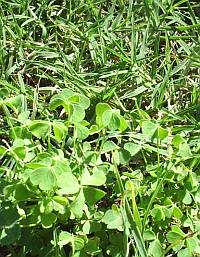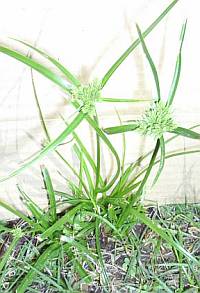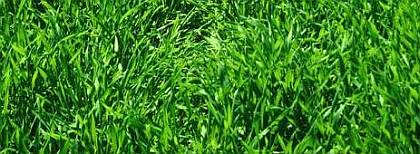WEED KILLER GUIDE:
How To Be Safe & Successful
Using weed killer seems inevitable, especially when good intentions alone or highly recommended organic options fail to get rid of weeds.
The common recourse is to grab a bottle of commercial weed spray, or a bag of Weed and Feed, when you notice it on display in most any store.
That may work, to a certain extent. But things can go wrong, especially for those who don’t read the label!
Do you prefer to know something about what you’re doing when you use chemicals around your family or pets?
Would you like to understand some basic truths about weed killers, the good, the bad, and the exceptions?
Information in this article is slanted toward the use of herbicide products specifically on lawns. However, most of it will prove useful for spraying weeds in other parts of your yard or garden.
FTC Disclosure:
If you make a purchase via a link on this site, I may receive a small commission on the transaction - at no added cost to you.
Sponsored Links
FACTS ABOUT WEED KILLERS & CHEMICALS
Satisfaction with any product comes when you have reasonable expectations about the results.
It may seem like the best product SHOULD kill everything you want it to kill, in one application, with no negative results, and very little bother.
That is not realistic. Here is what you need to know:
WEED DURABILITY (OR IMMORTALITY?)
Lawn weeds may die after one application of weed killer. Additional spraying may be required for more mature weeds, for perennial weeds with stronger root systems, or for some stubborn types, especially those with waxy or hairy covering.
Definitions:
Mature Weeds = the massive ones in your lawn because you waited too long;
Perennial Weeds = hardy weeds, like dandelions, that keep returning. By their nature, they survive season to season, unless you knock them out.
Stubborn Weeds = do not readily absorb herbicides, or drink it down and laugh in the face of danger; probably genetically modified by mad scientists, hence the ugliness of waxy or hairy coverings
.
MORE IS BETTER? OR NOT...
Weed killer does NOT work better with a stronger concentration. It is better to spray again, rather than go with a heavier dose which can have negative consequences.
Additional reasons to avoid this will follow below, but this is the #1 error that gardeners make when they get the notion to kill those darn weeds.
(You probably will need to spray twice, if the weeds are winning, so why waste extra product that you didn‘t want to spend money on in the first place?)
TIME TO KILL
Weed killers take time, more or less. Some work quickly, within hours you may see dieback. Others work slowly and may take many days before you notice any result.
(Fast is not best. This is not a race.)
A fast weed killer is usually non-selective and kills everything it touches, especially the lawn.
What matters is getting the best killer for a particular weed.
Temperature and the rate of growth affect the reaction of many weeds to chemicals.
(Cooler weather = slower results.)
WET OR DRY
Liquid weed spray usually provides better weed control than a granular product.
You can cover more of the weeds thoroughly or do spot treatment of lawn weeds with a liquid.
Instructions for dry weed killers (for example, Weed & Feed types) say the granules work better if they stick on the leaves. Here's a sample:
- Apply when weeds are young and actively growing, preferably in the morning when dew is on the grass.
- If grass is not moist at time of application, sprinkle lightly with water to hold the material and prevent dust drift onto non-target plants.
- Do not wash from weed leaves for 1 to 2 days after application.
In other words, "No Sticky, No Worky". The labels also say "possible pretreatment may be necessary if lawn is heavily overrun by weeds.
This seems to admit that a high percentage of weed kill is not automatic with these dry products. Low expectations may be warranted.
EASY OR CHEAP
Liquid weed killer is sold as a Ready-To-Use product or a Concentrate.
Ready-To-Use container sizes range from quarts to gallon. Some have hand trigger nozzles, some have various spring loaded pump mechanisms, and recently some have battery operated automatic functions. You will pay more for each level of convenience.
Weed killer concentrates can be used in your own spray bottle, a pump-up tank sprayer or a hose-end sprayer. Pay attention to the prices of various size bottles when you buy retail or on-line, especially when they don't make sense. Certain weed killers may be available in 1, 2, or 3 different concentrations even if the labels look very similar.
It is critical that you rely on the label recommendations for the dilution rate to use. Different weeds within different lawn grass varieties or different adjacent plants may be prescribed different dosages.
CAUTION: Do not use a fertilizer sprayer like the Miracle-Gro type that works with only one pre-set dilution rate. A sprayer that attaches to a garden hose must allow adjustment to vary the strength of concentration.
(The price for ready-to-use products is anywhere from 4 to 10 times the cost of mixing your own, so consider what quantity you will eventually use, and what convenience is worth to you.)
NON-COMPATIBILITY
Caution: be certain that the weed killer you select specifies on the label that it is safe to use on all lawns, or on your grass variety.
Some grass lawns are more sensitive than others.
Some varieties grass, like St. Augustine, can react as if they are a broadleaf plant instead of grass.
Some grasses may be tolerable of your chemical under certain conditions, but vulnerable in other situations like extreme heat, or stress from insects or disease or from prior chemical application.
Re-Application intervals have been established by manufacturers after testing and these stipulations should be observed.
LABELS SAVE LIVES & LAWNS
Read and follow all directions.
Do not merely glance over the basic info on the back of the bottle. Be aware that on most garden chemical bottles you can peel back the label for multiple pages with additional useful details.
Each chemical is different. Don’t assume that the mixing amount is the same for different brands of the same product or for similar products of any brand. The dosage may even be different on a repurchased weed killer from the last time you got it, perhaps because the percentage of active ingredient has changed.
Don't trust the wisdom of your neighbor, a family member or friend who tells you the great results he got from doubling the mixture. People lie, get lucky, or don't always pay the price of stupidity. You may. (My garden shop experience frequently dealt with requests to help out someone who was desperate to heal their lawn burned from a bad weed killer job.)
And don't add some other ingredient to the mixture without knowing from a reliable source (the label or the manufacturer or professional landscape publications) that the 2 chemicals won't have a compound effect of negative impact to your lawn.
CLEAN-UP
Failure to clean out all residue from spray or other application equipment may kill good plants later.
Sprayers used for chemicals that kill weeds should not also be used for fertilizers. Weed killers that are non-selective or designed for a specific use could have negative effects when used for an alternate weed application, unless thorough cleaning removes all traces of the previous product.
Any weed killer mixture left over must be disposed of in a responsible manner (usually on additional weeds elsewhere) and not spilled out indiscriminately or allowed to access storm drain systems. Check product labels for appropriate disposal of products and containers.
(Leaving mixture in the tank leaves residue that can clog the nozzle, and the mixture may lose potency. It is best to use the entire mix within a day or two, and mix fresh when needed.)
PETS AND PEOPLE
A common restriction on weed killing products will state it is safe for people and pets to go on the lawn once the spray has dried.
Check to confirm that. Some weed killers may have more severe limitations on exposure to the sprayed area.
Use your judgment here to reduce chemical exposure to a minimum, taking account that everyone's tolerance to these materials varies.
(Also avoid placing treated lawn clippings into your compost pile, if the compost will then go on fruit or vegetable plants.)
ORGANIC WEED KILLERS
Yes, there are some of these "safer" products for various garden use, but not much that works on weeds without harming your lawn.
Many of the organic weeder products are non-selective, or have a narrow window of application. So once again be mindful and read the label.
And even these natural products can be derived from materials that require sensible handling and usage, potentially causing harm if used incorrectly.
SELECTING THE CORRECT WEED KILLER

Wondering what happened to the good old stuff that used to work for your Dad?
The chemical industry is continually introducing new garden products.
They regularly remove old products, often due to environmental regulations, sometimes because it is not profitable for them to incur the cost of maintaining registration on a label.
Trust the new ones, if you have been attentive with your choice.
It pays to look around at the options when you are in a garden department with an extensive selection.
Double-Duty weed killer products can be an effective way to tackle multiple problems.
For example, a basic herbicide is a broadleaf weed killer safe to use on most lawns, but it would not affect crabgrass. It is now possible to get the same broadleaf killer with a crabgrass killer added.
This may cost more than the original single formula, but not as much as getting two separate products, and you have less labor.
Be cautious, however, about trying Neighbor Ned's boast about mixing his own garden cocktails. Chemicals that are combined can increase phytotoxicity (plant sensitivity and reaction to chemicals).
A mixture might be harmful to a plant even if both chemicals alone would not be. This is another reason why you should not increase the dosage of chemical in your spray mix.
THE BASIC TYPES OF CHEMICAL WEED KILLER:
BROADLEAF WEED TYPES
This will kill most broad-leaf weeds without hurting grass. Different brands have 2 to 4 active ingredients geared toward different types of weeds, or with a different mode of action. Always verify that it will be safe on your type of grass.
A great choice among products in this category is SpeedZone from DoMyOwnPestControl.com
GRASSY WEED TYPES
These are NOT safe to use on your lawn.
If it kills a weed grass, it will kill your lawn. It is great for any grassy weeds in your flower bed or ground cover areas. Grassy weeds in your lawn must be hand-pulled, or prevent them next season by using a pre-emergent weed killer. (There are a few exceptions to this, depending on lawn variety. Read the other articles.)
SEDGE OR NUT-GRASS TYPES

This is a very specific killer. One called SedgeHammer, formerly Manage, should be safe to use on most grass lawns and is very effective.
Some older weed killer products claim to kill nutgrass, but the active ingredient is MSMA, which is more commonly used to kill crabgrass. It may work alright, but check carefully about the safety of your grass variety.
(Nut-sedge reproduces from corms, little bulbs, that grow on the roots. These are difficult to kill except with repeat sprayings; almost impossible to hand-pull without digging up and sifting through the soil.)
NON-SELECTIVE TYPES
The well-known Round-up is the best example of this. There are many generic versions that offer the same active ingredient, though not the same surfactant which helps absorption.
All of these non-selective weed killers
will kill your grass.
They may be useful to you if you plan to kill everything prior to replanting a lawn. Also, if the weed density is so heavy that the grass has been overtaken, you may decide to use this type, avoiding overspray as much as possible, and plan to reseed the bare area later.
SPECIAL MENTION
Bermuda grass is a creeping grass that is used by some as a lawn grass. Other people consider it a weed when it invades their lawn of fescue, rye or bluegrass.
A particular weed killer developed to kill broadleaf weeds was found to be effective in controlling Bermuda grass in turf.
This product,Turflon Ester, is great for those who need to remove Bermuda. It will take numerous applications, 30 days apart, so start early in the growing season.
But it would otherwise be impossible to eliminate Bermuda in regular turf, so check this out (and read all limitations and warnings about some grass types).
A new series of articles addresses that last mentioned problem. Check out these articles for detailed information on the topic of killing bermuda in a cool-season grass lawn.
Go to Killing Bermuda Grass in Fescue Lawns
Go to Turflon Ester Weed & Bermuda Grass Killer
Go to Ornamec Bermuda Grass Killer
When selecting a weed killer, take the time to determine if it makes the necessary claim to be both effective and safe for your situation.
FINAL TIPS ON USING
WEED KILLER ON A LAWN
Grass endures constant stress, and keeps on growing. That is why we love it. No other plant can handle the abuse of constant pruning, being walked on, having the soil around its roots compacted, endure heat, cold, too much or not enough water, and still keep growing!Spraying chemicals is one more added stress, so reduce the impact as much as you can.
- Avoid spraying in extremely hot weather. Temperatures above 85 degrees will amplify the stress on the grass and cause damage. It is best to wait for temperatures below 80 degrees.
- Some apparent damage to lawns is not unusual after spraying chemicals, especially in hot weather. This wonderful plant will usually grow right through it, and the damage should no longer be visible after a couple of mowings.
- Do NOT apply any chemical product to young grass. It does not have the same resistance to chemicals as mature grass, and will probably be burned, possibly die. Three months is the absolute earliest to try it, and don’t go heavy on the concentration. Waiting 4-5 months would be a better approach, unless the manufacturer indicates otherwise.
- NO rain or irrigation for 24 hours is commonly posted, since many weed killers need to remain on the foliage that long. Check to be sure, then plan your spraying accordingly. In hot weather, consider watering your lawn the day prior to spraying to give it more resilience.
- Do NOT mow the lawn for 2-3 days before you spray. Weed killers must be absorbed into the leaves of the weed, and short weeds drink up less chemical. Wait at least a few days after mowing to spray, and do not mow for several days after spraying, which can allow more chemical to get down to the root.
Remember, the earlier you attack the weeds in your lawn, the easier it is to get rid of them. If it is later in the season, just be persistent.
Make plans to prevent weeds next year with preemergent and building up healthy soil and grass.
Check out the rest of the Lawn Care site for help with doing that!
Sponsored Links
Go to Lawn Weeds general info page.
Go to Home-Made Weed Killer for an interesting diversion.
Go to Top of Page
Go to Home Page of Lawn Care.

BRING ON SPRING!
A Stronger, Greener Lawn
Starts Now...
with help from DoMyOwn
Products * Videos * Schedules * Guides

WEED WHACKER from: DoMyOwnPestControl.com